Efficient note taking isn’t just administrative tasks. It’s essential for quality patient care and practice management sustainability.
You’re juggling complex clinical notes, treatment plans, and hipaa compliance requirements while maintaining therapeutic presence with clients.
AI powered note taking tools are transforming how mental health professionals document therapy sessions. These note taking apps can reduce documentation time by 70% while improving note accuracy and consistency.
This comprehensive review examines the best note taking tools for therapists specifically designed for mental health services, helping you choose the right solution for your practice’s unique needs and workflow preferences.
What Therapists Should Look for in Note Taking Tools
Choosing the right note taking app requires evaluating features that directly impact your practice efficiency and hipaa compliance standards.
Security and Compliance
Your chosen therapy note software must offer hipaa compliance data handling with robust encryption. Look for platforms that provide clear documentation of their security protocols and secure data handling practices.
EHR Integration Capabilities
Seamless integration with your existing ehr system eliminates double data entry. The best note taking tools for therapists offer native integration or sophisticated export features that maintain formatting and reduce transfer errors.
Mental Health-Specific Features
- Pre-built soap notes and dap notes templates
- Mental health terminology and progress assessments frameworks
- Structured progress notes tailored for therapy sessions
- Risk assessment documentation capabilities
Automation and Efficiency
Time-saving features like session recordings transcription, auto-population of client data, and customizable templates significantly reduce documentation time. Consider ai tools that learn your note writing style and preferred terminology to help you save time.
Cost Structure and Implementation
Evaluate pricing models against your caseload volume. Session-based pricing may suit part-time practitioners, while unlimited notes plans benefit high-volume practices.
Factor in the learning curve. Complex systems may offset time savings during initial implementation.
Practice Scalability
Choose note taking tools that accommodate practice growth, offering team features and user friendly management as needed. Consider whether the platform supports multiple therapy modalities if you plan to expand mental health services.
Comparing the Best AI Tools for Mental Health Documentation
After evaluating dozens of note taking apps, we’ve identified eight standout ai tools that consistently deliver results for mental health professionals. Each platform offers unique strengths, from native ehr system integration to comprehensive free tiers.
Supanote – Native EHR Integration for Mental Health
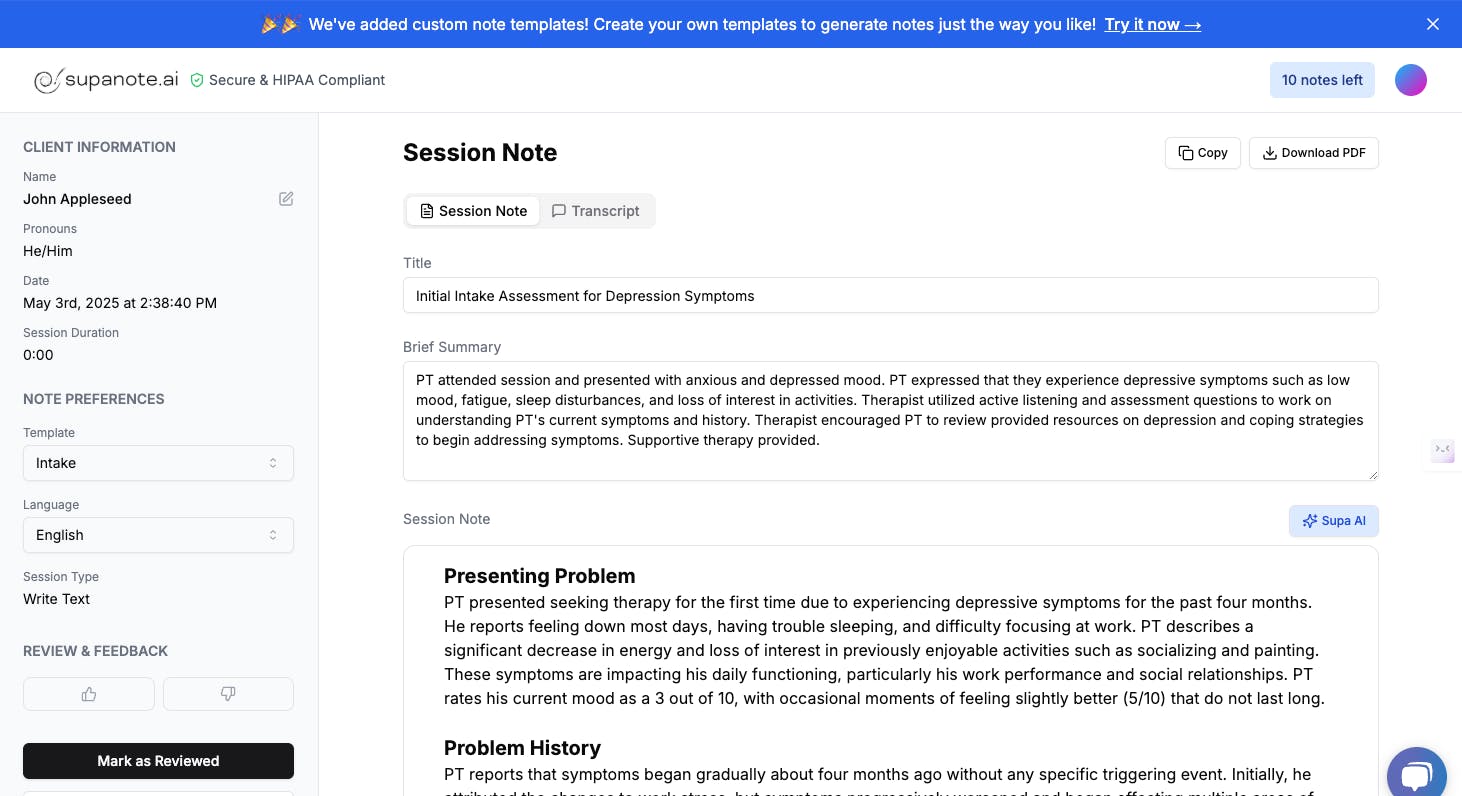
Supanote stands apart as one of the few platforms built exclusively for mental health professionals by healthcare providers. The platform’s “Super Fill” button creates true native ehr system integration, eliminating the copy-paste workflow that plagues most other solutions.
- Deep personalization engine learns your documentation process and preferred terminology over time
- Native autofill works seamlessly with major ehr system platforms without manual client data transfer
- Mental health-specific language models trained on therapy notes documentation patterns
- Superior human support team with rapid feature development cycles
- Free plan available for therapists testing the platform
Pricing: Starting at $29.99/month for 40 notes, with professional plans at $49.99/month
Best suited for: Therapists prioritizing seamless ehr system workflow integration and personalized documentation

Mentalyc – Comprehensive Mental Health Documentation
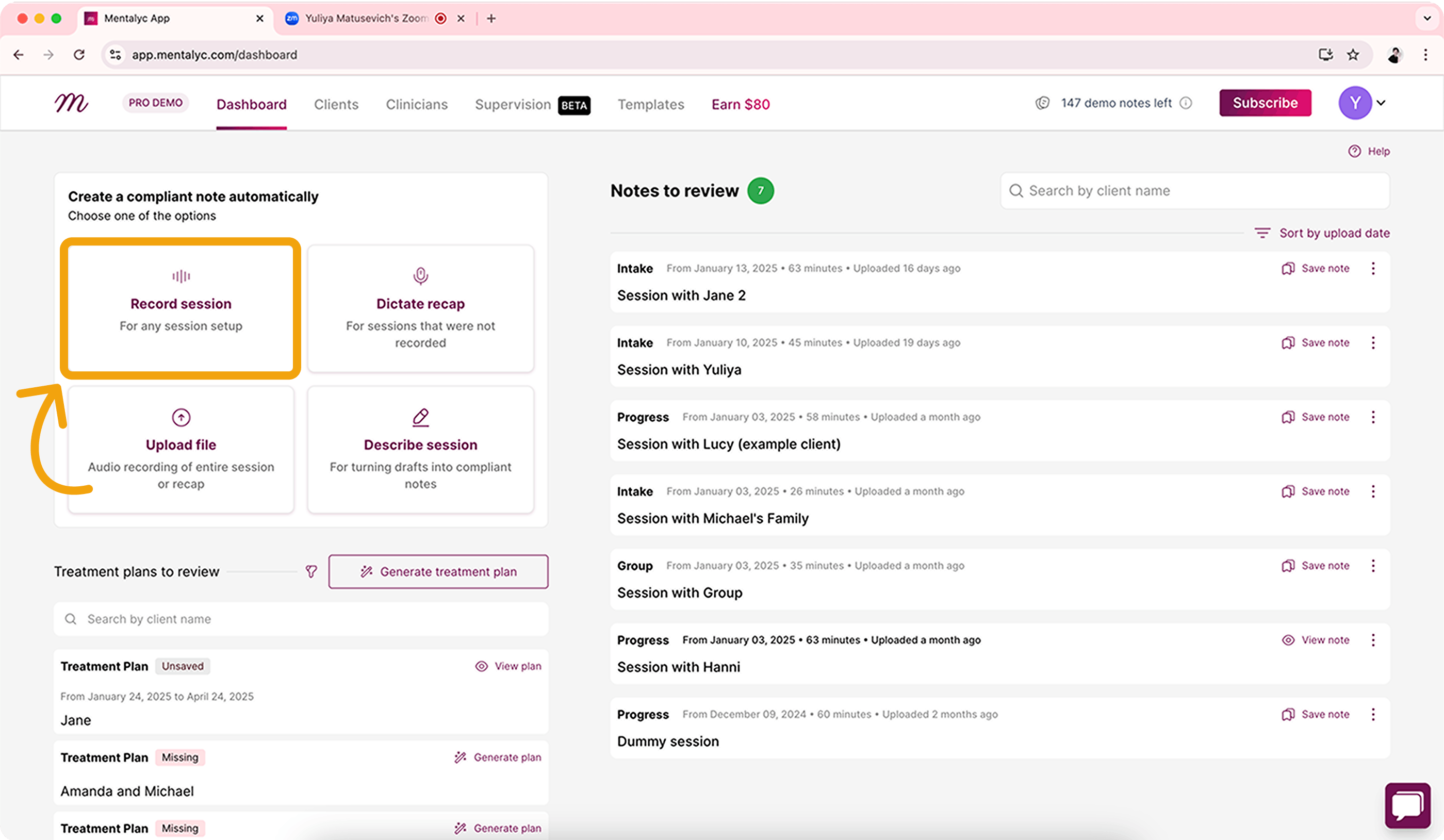
Mentalyc offers robust soap notes and dap notes template systems designed specifically for therapeutic documentation. The platform excels in team environments where consistent documentation standards matter.
- Pre-built note templates for various therapy modalities including CBT, DBT, and trauma-focused approaches
- Team collaboration features with shared customizable templates and documentation standards
- Copy-paste workflow integrates with most ehr system platforms
- Strong template customization allows adaptation to specific practice management needs
- Annual billing provides significant cost savings for consistent users
Pricing: Mini plan at $19.99/month for 40 notes, Professional at $39.99/month for 100 notes
Best suited for: Group practices and therapists who prefer structured template-based documentation
Upheal – Free Unlimited Notes with Premium Features
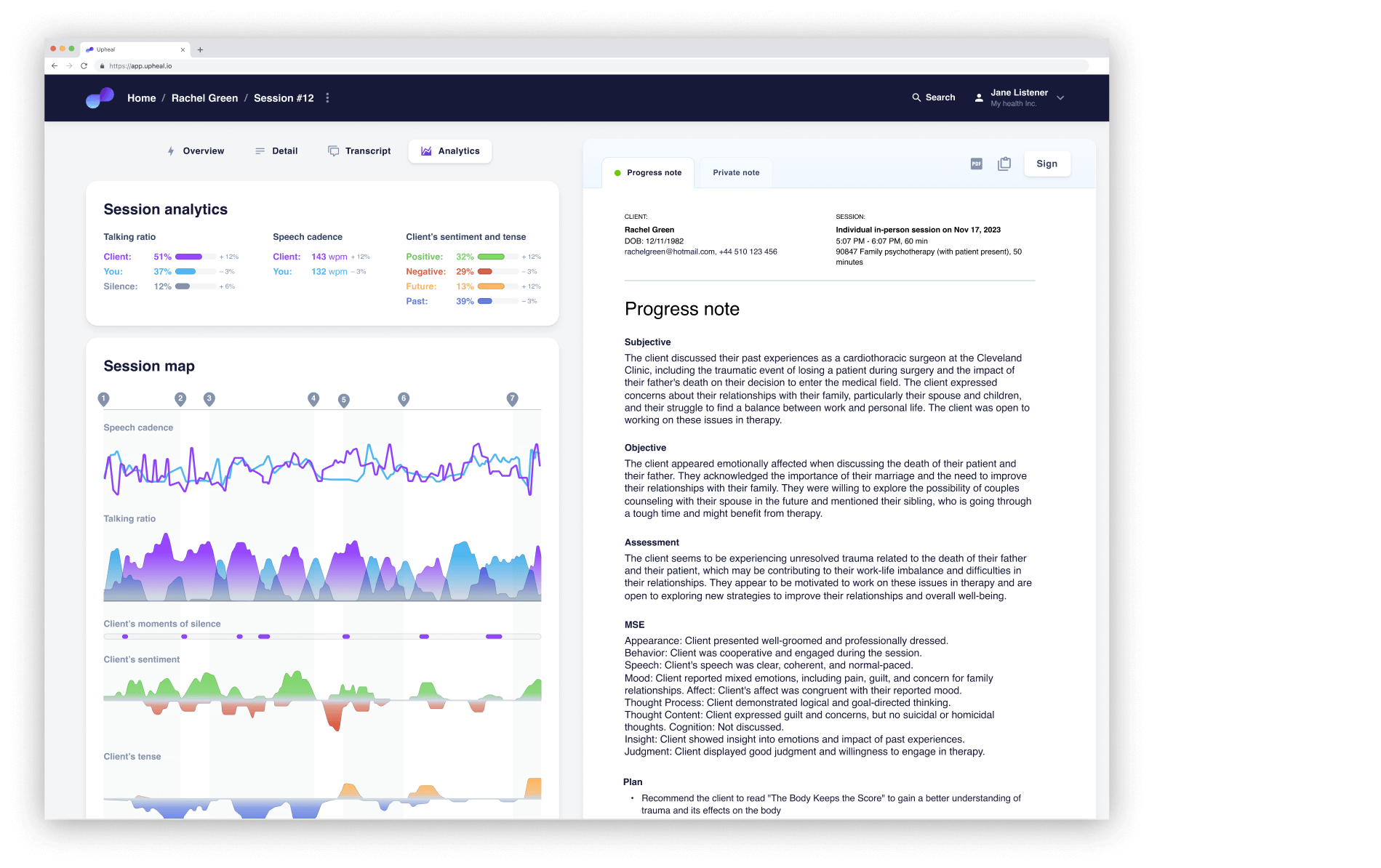
Upheal’s permanent free tier with unlimited notes makes it exceptionally accessible for new practitioners and budget-conscious practices. Recent significant funding rounds indicate strong development trajectory.
- Unlimited notes forever on free tier without hidden limitations
- Built-in session recordings with ai powered analysis and insights
- Premium features include advanced analytics and detailed session breakdowns
- Strong financial backing ensures platform stability and continued development
- Comprehensive therapy sessions insights help identify treatment plans patterns
Pricing: Free tier with unlimited notes, premium plans from $19/month
Best suited for: New practitioners, budget-conscious therapists, and those wanting robust free options
Blueprint – Session-Based Mental Health Documentation
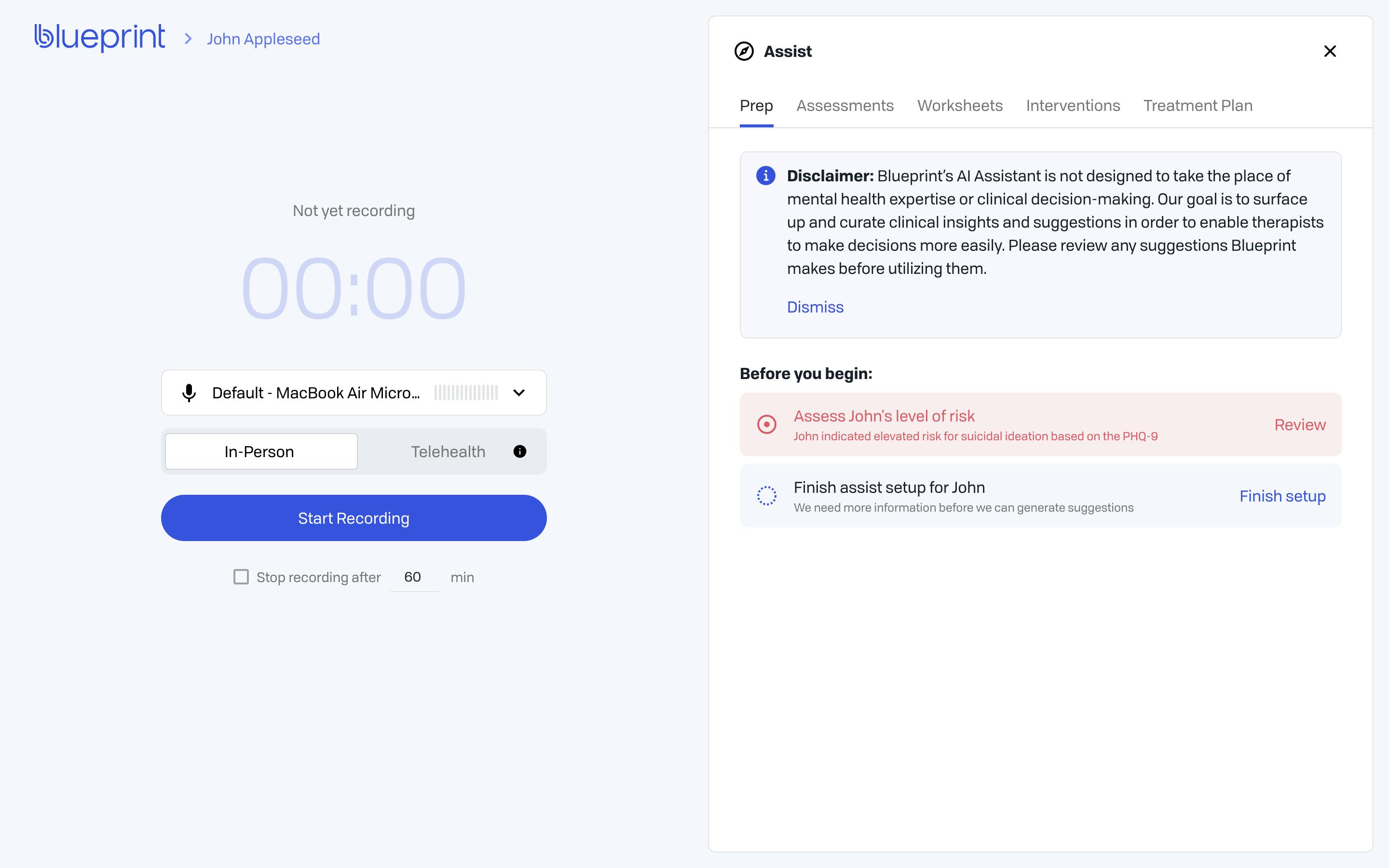
Blueprint’s recent 2.0 upgrade introduced enhanced ai note capabilities with a unique auto-upgrade pricing system that scales with usage. The session-focused approach aligns well with therapy practice billing cycles.
- Blueprint 2.0 features significantly improved ai note accuracy and speed
- Auto-upgrade system automatically adjusts pricing based on actual usage
- Mental health-specific workflows designed around therapy sessions structure
- Session-based pricing model matches therapy practice revenue patterns
- Current promotional pricing offers 50% off first three months
Pricing: Starting at $29/month with usage-based auto-upgrade system
Best suited for: Established practices with predictable session volumes seeking advanced ai tools capabilities
Quill – Summary-Based Documentation Without Recordings
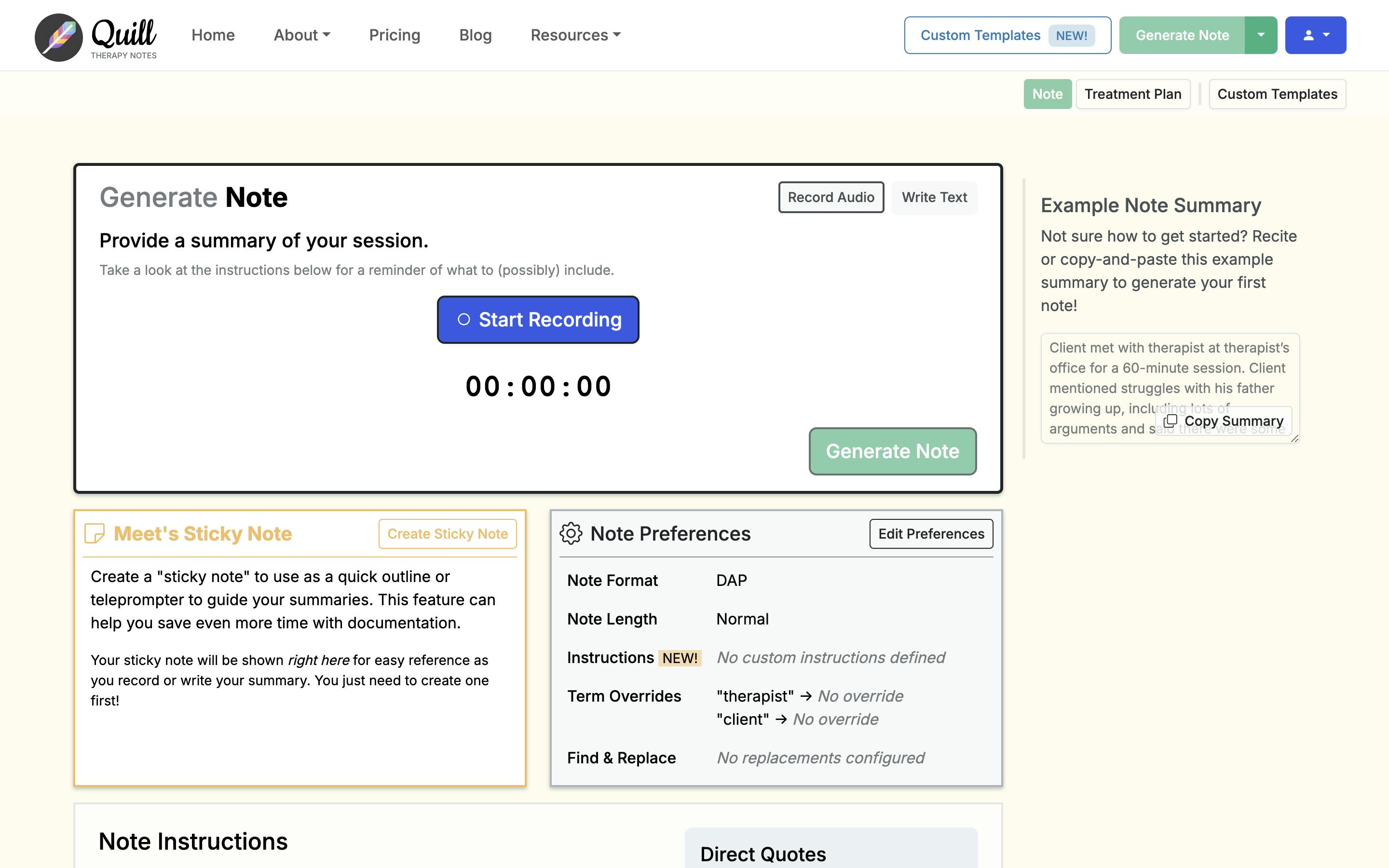
Quill takes a unique approach by generating notes from session summary content rather than requiring audio session recordings. This appeals to mental health professionals concerned about client confidentiality or recording logistics in their private practice.
- No session recordings required – works with therapist-provided session summary data
- Unlimited notes at flat monthly rate provides predictable costs for practice management
- User friendly interface requires minimal learning curve for healthcare professionals
- Team pricing offers significant per-user discounts for group practices
- Solo practitioner focus with streamlined feature set
Pricing: $20/month for unlimited individual notes, team pricing at $16/month per user
Best suited for: Solo practitioners preferring summary-based documentation without audio recording
Berries – Real-Time Recording with Multilingual Support

Berries distinguishes itself through real-time session recordings capabilities and comprehensive multilingual support, making it valuable for diverse practice environments. The ai note generator processes therapy sessions as they happen.
- Real-time session recordings with live transcription during therapy sessions
- Multilingual support accommodates non-English speaking clients and bilingual practices
- Generous free tier provides 20 initial sessions, then 10 monthly sessions
- Higher price point reflects sophisticated real-time processing capabilities
- Frequent promotional offers reduce initial cost barriers
Pricing: $99/month with generous free tier (20 initial sessions, then 10/month)
Best suited for: Multilingual practices wanting real-time session documentation
Yung Sidekick – Session-Based Pricing for Mental Health Services
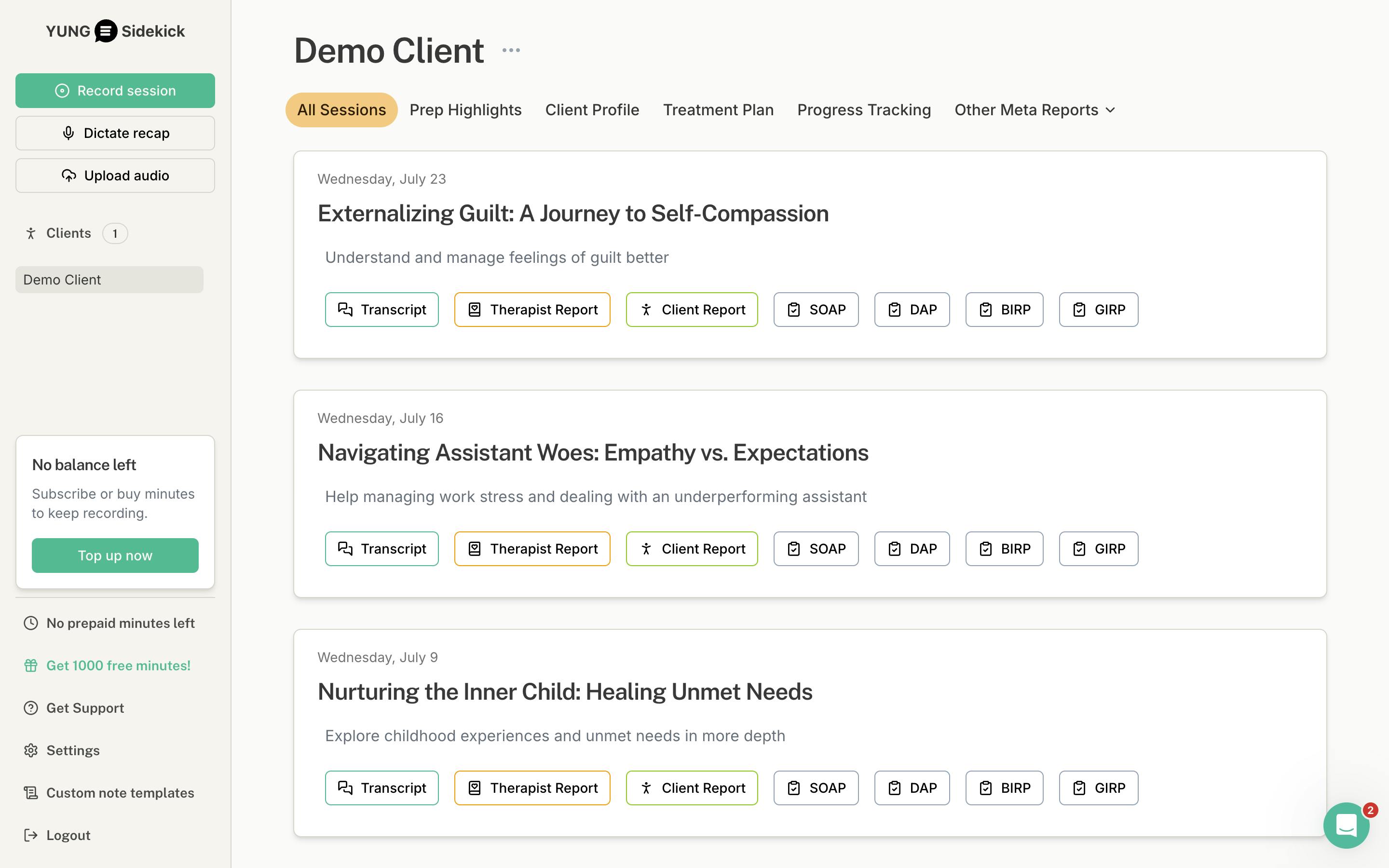
Yung Sidekick uses graduated session-based pricing tiers with overage options, making it flexible for practices with varying monthly volumes. The mental health focus ensures relevant note templates and terminology for clinical notes.
- Session-based pricing aligns with therapy practice billing and revenue cycles
- Overage pricing at $0.03 per minute provides flexibility for busy months
- Mental health ai tools training improves accuracy for therapeutic terminology
- Graduated pricing tiers accommodate practices from small solo to large group
- Seven-day free trial with annual discount incentives for healthcare providers
Pricing: Starting at $39.99/month for 130 sessions, scaling to $99.99/month for 400 sessions
Best suited for: Practices with variable session volumes needing flexible pricing structures
Autonotes – Multi-Specialty with Mental Health Support
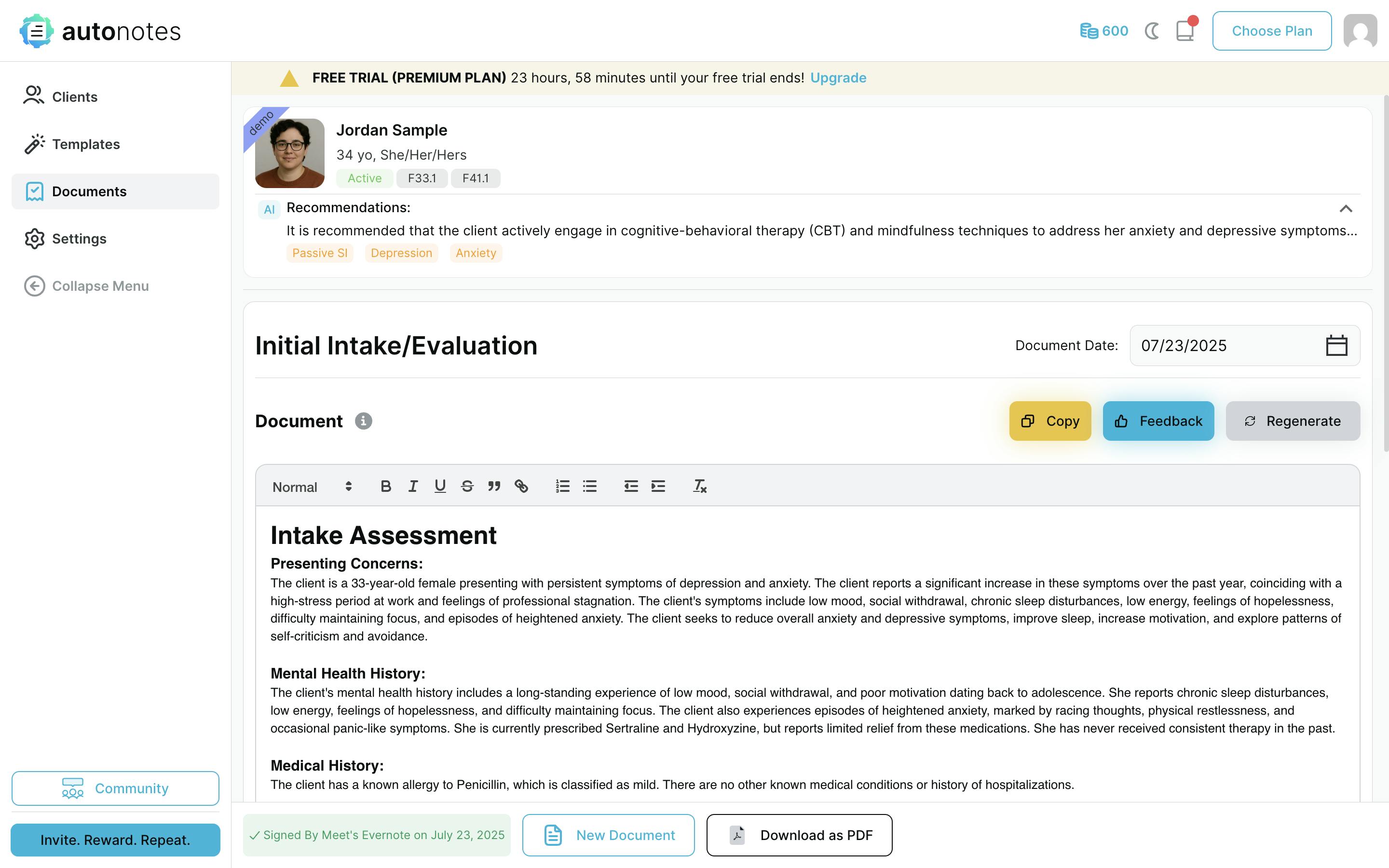
Autonotes serves multiple medical specialties while maintaining strong mental health documentation capabilities. The credit-based system and large user base indicate platform maturity and reliability for sensitive patient health information.
- Credit-based system provides usage flexibility across different documentation needs
- PHI de-identification features enhance privacy and hipaa compliance capabilities
- Large 65,000+ user base across medical specialties demonstrates platform stability
- Professional tier offers enhanced customizable templates for established practices
- 24-hour unlimited trial provides comprehensive platform evaluation
Pricing: Starting at $25/month with 10 free documents, Professional tier at $55/month
Best suited for: Multi-specialty practices wanting proven platform with broad medical support
Comparison Table: Best Note-Taking Tools for Therapists
Here’s a quick comparison of the top note-taking tools specifically designed for mental health professionals, highlighting their starting prices and ideal use cases.
Tool | Starting Price | Best Suited For |
|---|---|---|
Supanote | $29/month (Free plan available) | Therapists needing native EHR integration and personalized workflows |
Mentalyc | $19.99/month | Mental health professionals wanting comprehensive SOAP/DAP templates |
Upheal | Free (unlimited basic notes) | Practices needing session recording with built-in analysis features |
Blueprint | $29/month | Session-focused practitioners preferring auto-upgrade pricing models |
Quill Therapy Notes | $20/month | Solo practitioners who prefer summary-based documentation |
Berries | $99/month (generous free tier) | Multilingual practices requiring real-time recording capabilities |
Yung Sidekick | $39.99/month | High-volume practices with session-based pricing preferences |
Autonotes | $25/month | Multi-specialty practices needing credit-based flexibility |
This comparison helps illustrate that while pricing is important, the best choice depends on your specific workflow needs, practice size, and integration requirements with your existing EHR system.
Making the Right Choice for Your Practice
Selecting from the best note taking tools for therapists requires matching your practice’s specific needs with each tool’s strengths. The right note taking app transforms your documentation process significantly.
Practice Management Size and Budget
Solo healthcare practitioners often thrive with Upheal’s unlimited notes on the free tier or Quill’s straightforward $20/month model. Larger private practice environments benefit from Mentalyc’s team pricing at $16/month per user or Supanote’s scalable plans starting at $19.99/month.
EHR System Integration Requirements
If seamless electronic health record workflow is critical, prioritize ai tools with native integration like Supanote’s ‘Super Fill’ button. For copy-paste workflows, Mentalyc and Blueprint offer robust formatting options that maintain note accuracy.
Workflow Preferences
Recording-based mental health professionals should consider Upheal or Berries for session documentation capture capabilities. If you prefer summary-based documentation without session recordings, Quill therapy note software provides exactly this approach for your note taking process.
Practice Management Scalability Considerations
Look beyond current needs when selecting therapy notes solutions. Yung Sidekick’s session-based pricing ($39.99 for 130 sessions) works well for growing practices, while Blueprint’s auto-upgrade system adapts to increasing therapy sessions volume.
Maximizing Trial Periods
Start with the best note taking app options offering substantial free trials: Upheal’s permanent unlimited notes tier, Autonotes’ 24-hour unlimited access, or Supanote’s 14-day trial. Test your actual clinical notes workflows rather than just exploring features to save time on administrative tasks.
The right choice balances immediate functionality with long-term practice growth. Your documentation process becomes more efficient rather than more complicated when you select appropriate ai powered note taking solutions.
Frequently Asked Questions
Q: Are AI note taking tools HIPAA compliance approved for mental health services practices?
A: Most reputable note taking tools designed for mental health professionals are HIPAA compliance certified and include Business Associate Agreements (BAAs). Always verify HIPAA compliance and request a signed BAA before using any note taking app with sensitive patient health information. Look for therapy note software that offers secure data handling and password protection as standard security measures.
Q: How much time can the best note taking app actually save mental health professionals?
A: Most healthcare professionals report 70-80% reduction in documentation time when using ai note generator solutions. Instead of spending 15-20 minutes per clinical notes entry, you can complete structured notes in 3-5 minutes using customizable templates. This translates to saving 2-3 hours daily for full-time healthcare providers.
Q: Do I need session recordings to use these note taking tools?
A: Not necessarily for effective note writing. Some therapy notes solutions like Quill work with session summary information rather than recordings. However, recording-based note generator tools often provide more detailed notes and structured progress notes. Always obtain proper client confidentiality consent before recording in person sessions and check your state’s recording laws.
Q: Can these note templates integrate directly with my existing electronic health record system?
A: Integration varies significantly between note taking app platforms. Some solutions like Supanote offer native EHR system integration with auto-fill capabilities for progress notes, while others require copy-paste workflows. Check if your specific system supports soap notes and dap notes formats before committing to a platform, as seamless integration can save time.
Q: What happens if I exceed my monthly therapy notes limit with subscription plans?
A: Most ai therapy notes platforms offer overage pricing or automatic upgrades when you exceed limits. For example, Yung Sidekick charges $0.03 per additional minute, while others may temporarily restrict access until the next billing cycle. Choose a plan with buffer room above your typical monthly progress notes volume.
Q: Are these ai tools suitable for specialized therapy modalities like EMDR or DBT?
A: Many modern ai note taking solutions include note templates for specialized modalities including EMDR, CBT, DBT, and family therapy approaches. Tools like Mentalyc offer extensive template libraries with soap notes and structured progress notes for different therapeutic approaches. Verify that your specific modalities are supported during free trials to ensure proper client documentation.
Q: How accurate are AI-generated progress notes compared to manual note writing?
A: AI-generated therapy notes typically achieve 85-95% note accuracy when properly trained on your documentation style. The quality of clinical notes improves over time as ai note systems learn your preferences and note formats. Always review and edit generated notes in your own words before finalizing, as you remain clinically and legally responsible for all patient data documentation.
Q: Can I use these psychotherapy notes tools for group therapy sessions?
A: Most ai therapy notes tools can handle group in person sessions, though some may charge per participant or require specific group note templates. Recording group sessions requires client confidentiality consent from all participants and may have additional privacy considerations with sensitive patient health information. Check with your tool’s support team about group session capabilities and supervision notes features.
Conclusion
The right note taking app can transform your practice efficiency and reduce administrative burden significantly. Each platform serves different practice management sizes, workflows, and integration needs—there’s no universal best note taking tools for therapists choice.
Start with free trials to test real-world compatibility with your existing systems and note taking process. Pay special attention to EHR system integration capabilities, as native integration like Supanote’s ‘Super Fill’ feature can eliminate time-consuming copy-paste workflows entirely for your therapy notes.
Invest in solutions that grow with your practice management needs and enhance rather than disrupt your therapeutic focus. The best note taking app will streamline your clinical notes while maintaining client documentation quality and ensuring patient care remains your priority through efficient note taking.


